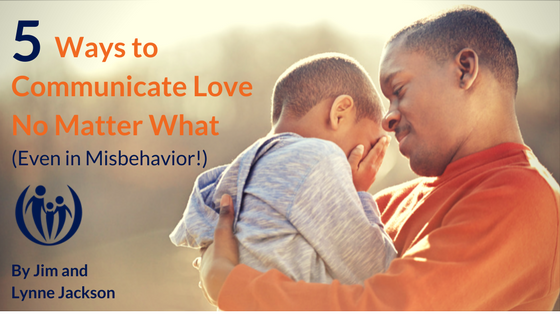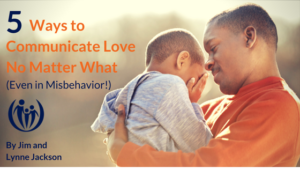
5 Ways to Communicate Love No Matter What (Even in Misbehavior!)
This is part of a series on “Discipline that Connects®: Four Powerful Messages All Kids Long to Hear”.
Communicating “love no matter what” when kids misbehave can seem like a tall order. But when these five simple changes come from a calmed heart, they can powerfully turn the tide of negative discipline encounters.
1. Get down on kids’ level
Standing posture is frequently employed as a high-pressure sales tactic because it puts the seller in an intimidating position that is much more likely to coerce a decision to buy. Parents can often loom over small children, and even tall teens may still think of parents as bigger and more powerful. One important way we can communicate being “for” our children is to “shrink” our posture by sitting or kneeling and keeping open body language (e.g. uncrossed arms).
2. Give gentle touch — with permission
Safe, affectionate touch is a powerful communicator of love. A hug or a gentle hand on the shoulder can be calming, reassuring, and connective — if the child doesn’t perceive some other agenda. If we put a hand on our son’s shoulder during an argument with any hint of control he reacted angrily, but our kids usually appreciated the offer of a hug when they were ready.
3. Empathize
When you can articulate and identify with your children’s feelings, it helps them to know that you are on their side. Take your best guess at what your child might be feeling and make an observation — or simply ask her. This can range from simple toddler-talk: “You’re mad! You want to go outside!” to teen-talk: “I can imagine how frustrating it is to want to go hang with your friends after a hard day of school and you’ve got a ton of homework.”
4. Really listen to your child
When my children feel they are being heard, they feel respected, which makes them far less inclined to continue defiant behavior. Show your understanding by restating your child’s words with “what I hear you saying is” — or maybe just be quiet for a little while! Sometimes children just need a good listener.
5. Verbalize “I love you”
If you can make a habit of expressing your love to your children in all different kinds of times, positive behavior or not, we believe you will begin to see different outcomes with your children, and they will begin to internalize the message of “love no matter what.”
This may seem obvious, but it’s important. Telling our kids we love them requires a sincere heart, free of manipulation. So don’t write us next week to tell us “I tried that unconditional love thing and it didn’t work…” 😉
What are your parenting strengths?
You’ve got them. Knowing your strengths will help you become the best parent you can be. Knowing your parenting challenges is useful information too. Take our FREE ASSESSMENT.


